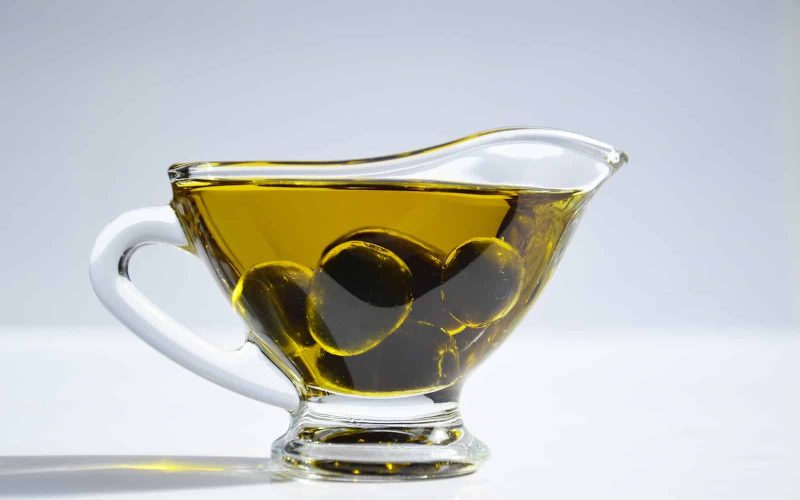Are you looking for substitutes for olive oil in the kitchen? Olive oil is widely used in cooking and baking. However, it can be expensive.
But if you are looking for a more cost-effective substitute, you have come to the right place.
Many different substitutes offer a similar texture, flavor, and nutritional value as olive oil while providing other advantages.
Whether you’re trying to reduce your grocery bill or just looking for something different in the kitchen, here are some excellent substitutes for olive oil that will add delicious flavor and nutrition to your dishes.
1. Flaxseed Oil
Flaxseed oil is undoubtedly one of the increasingly popular substitutes for olive oil and other vegetable oils, as it has many of the same benefits, including a high smoke point and a light taste.
It is also rich in Omega-3 fatty acids, which can help reduce inflammation, improve heart health, and provide cancer prevention properties.
In addition to being a healthier alternative to olive oil when used for cooking and baking, flaxseed oil can be added to smoothies or salad dressings for extra flavor and nutrition.
It may even help to ward off colds and boost the immune system due to its high levels of Vitamin E and phytochemicals.
Flaxseed oil should be kept in a cool, dark place like the refrigerator to preserve its beneficial properties.
2. Grapeseed Oil
Grapeseed oil is becoming more popular as a substitute for olive oil due to its many benefits and uses.
Grapeseed oil has a light, neutral flavor that is ideal for recipes that call for a mild, clean taste.
It also has a higher smoke point than olive oil, which means it can take the heat of intense cooking temperatures without heating up too quickly, which could affect the flavor of the food.
Furthermore, grapeseed oil is rich in polyunsaturated fats and powerful antioxidants such as Vitamin E and beta-carotene, making it a healthy option for everyday use.
In addition to health benefits, grapeseed oil offers an economical alternative to olive oil. It is rising in popularity among home cooks who are looking for a cost-effective way to cook delicious meals.
Grapeseed oil can often be purchased for lower prices than other vegetable oils due to its widespread availability.
Many brands now offer organic options that do not contain additives or preservatives, ensuring the purest taste with no unpleasant aftertaste.
Grapeseed oil’s unique combination of natural flavors makes it one of the perfect substitutes for olive oil when used in salad dressings or cooked foods like stir-fries or sauces.
3. Avocado Oil
Avocado oil is an extremely versatile and nutritious oil that can replace olive oil for various cooking applications.
It has a high smoke point of up to 500°F, making it ideal for stir-frying, sautéing, roasting, and more.
Avocado oil is similar to olive oil in its makeup; both are rich in monounsaturated fatty acids and antioxidants.
The major difference between the two oils is that avocado oil has a higher saturated fat content, giving it a nuttier flavor than olive oil.
Also, it makes it more suitable for higher-temperature applications like deep frying or searing.
Avocado oil is widely considered to be healthier than olive oil due to its high levels of unsaturated fatty acids and antioxidants such as vitamin E and carotenoids.
Additionally, it contains higher levels of beneficial phytochemicals that may help reduce inflammation and protect against disease.
On top of this, avocado oil is easy to digest due to its low levels of detrimental saturated fats compared with other oils such as coconut or palm.
Moreover, compared with refined vegetable oils like canola or soybean, avocado is practically devoid of trans-fats linked to various chronic illnesses, including heart disease.
For these reasons, using avocado oil as one of the substitutes for olive oil can provide numerous health benefits while still resulting in delicious meals.
4. Sunflower Oil
Sunflower oil is one of the great substitutes for olive oil. It is made from sunflower seeds and is rich in omega-6 fatty acids, which can help lower cholesterol and balance blood sugar levels.
Sunflower oil also contains antioxidants, which can protect cells against damage caused by free radicals.
Additionally, since it has a very high smoke point (over 450F), it’s perfect for high-heat cooking, such as deep-frying or stir-frying.
Sunflower oil has a light flavor that won’t overpower the flavor of the food used to cook, making it great for dressings and sauces.
Sunflower oil is an excellent replacement for olive oil when cooking, and it can also be used topically to moisturize skin and hair.
Furthermore, it contains linoleic acid, an omega-6 fatty acid comprising about 70% of its composition. This can be beneficial in treating skin conditions such as acne and eczema.
Sunflower oil also hydrates dry or damaged hair while adding shine without weighing it down.
What’s more? When using sunflower oil on your skin or hair, you can add essential oils of your choice to create a personalized scent and nourishing benefits.
Overall, sunflower oil provides many health benefits and is one of the affordable substitutes for olive oil for both culinary endeavors and beauty purposes.
5. Ghee
Ghee, or clarified butter, is an increasingly popular alternative to olive oil for cooking and baking.
It has a high smoke point that makes it ideal for frying or sautéing dishes without burning them, and a milder flavor than olive oil.
Ghee, one of the best substitutes for olive oil, also stores longer and won’t round up when cooled, making it a convenient choice for busy cooks.
Furthermore, as ghee is derived from butter, it contains higher amounts of beneficial saturated fats than olive oil.
These offer numerous health benefits, such as improved digestion and lower cholesterol levels.
Several ghee alternatives offer similar benefits for those with dietary restrictions or food allergies, such as dairy intolerance.
6. Vegetable Stock
Vegetable stock is definitely one of the excellent substitutes for olive oil when cooking. This versatile ingredient adds flavor and moisture to dishes without the need for added fat or calories.
Vegetable stock can also be used instead of olive oil when roasting vegetables or frying foods like pancakes, where the extra fat content would be undesirable.
Vegetable stock is made by combining vegetables with water and simmering them until the vegetables are cooked through and much of the liquid evaporates.
The remaining reduced liquid can be used as a flavorful base for soups, stews, sauces, marinades, and more.
When substituting vegetable stock for olive oil, use half a cup per every tablespoon of oil your recipe calls for. This will provide a flavorful base and additional moisture to your dish.
Additionally, use vegetable stock at room temperature as cold temperatures may congeal some of the oils from the vegetable extract in your dish.
Replacing olive oil with vegetable stock is an easy switch to make in almost any recipe for those looking to cut back on their overall fat intake.
It adds flavor where needed and is an all-natural product, so there is no worry about ingesting artificial ingredients or unhealthy processed oils.
Give your favorite recipes a healthier and more delicious twist by trying out this tasty specialty of substitutes for olive oil today!
7. Walnut Oil
Walnut oil is a great substitute for olive oil in many recipes, as it has a slightly nuttier flavor that adds depth and richness to dishes.
Walnut oil is also high in essential fatty acids, including linoleic acid and alpha-linolenic acid, making it a healthier choice for cooking than other oils.
This type of oil is also ideal for frying foods because its smoke point is higher than that of olive oil, meaning it won’t burn as quickly.
Also, it can be used in dressings, marinades, and sauces to give them an extra layer of flavor.
While walnut oil may cost more than some types of olive oil due to its shorter shelf life and the fact that it requires more effort to process and extract from the fruit, it’s still worth considering as an alternative if you want a healthier option with added nutritional benefits. We aren’t done with this list of the best substitutes for olive oil.
8. Water
Water can be used when looking for substitutes for olive oil, especially when avoiding the calories and added fats associated with regular cooking oils.
Olive oil is higher in fat and calories than other cooking oils, such as canola or grapeseed.
Replacing olive oil with water gives meals a lighter feel which helps reduce caloric intake without sacrificing flavor.
Water may also substitute for olive oil in baking recipes due to its lower fat content.
By swapping out olive oil with water, baked goods come out fairer and more fluffy than those made with extra virgin olive oil or other types of cooking oils.
The substitution also helps reduce calories while maintaining the flavor usually associated with the dessert.
Concentrated juices, such as orange or grapefruit, may be used to replace some of the needed liquid when baking cupcakes or muffins and add a subtle hint of citrus that pairs nicely with sweet treats.
9. Peanut Oil
Regarding the various substitutes for olive oil, peanut oil is a type of edible oil derived from peanuts.
It is commonly used as a cooking oil and is preferred for many Asian cuisines due to its neutral taste.
Peanut oil is also known for its high smoke point, which makes it an ideal substitute for olive oil when cooking at higher temperatures, such as in stir-fries or deep-fried dishes.
In addition, peanut oil can be substituted with olive oil in recipes that require slight flavorings, like dressings and vinaigrettes.
While both oils can be used interchangeably, some differences should be considered.
For example, peanut oil has a stronger flavor than olive oil, and its greater saturated fat content makes it more prone to rancidity when exposed to heat or air.
Additionally, peanut allergies are quite common, so people who need to watch out for them may want to avoid using peanut oil in recipes where the flavor might stand out too much.
On the other hand, Olive Oil has a distinctively milder flavor and lower saturated fat content, making it pricier and more shelf-stable.
10. Butter
Butter, in many ways, can be used as one of the substitutes for olive oil when cooking. Butter has a very similar taste and texture to olive oil, so it can be used in pretty much the same way.
It’s great for sautéing vegetables or meats, pan-frying potatoes or fish, and smothering garlic toast.
It’s also an excellent base for traditional sauces like hollandaise or béarnaise sauce. The big difference between butter and olive oil is that butter has a lower smoking point than olive oil, so it should be used with slightly lower heat when cooking with it.
This is due to the milk solids within the butter, which will burn more quickly than the oil in olive oil.
Moreover, because of its high-fat content, butter’s creamy richness lends itself well to soups and sauces.
Furthermore, it provides a nice nutty flavor to roasted vegetables (such as Brussels sprouts), giving them an extra layer of flavor that can’t be achieved by just plain olive oil.
Additionally, some types of baking are far superior with butter rather than oils – cakes made with butter over oils tend to hold up better over time without becoming dry.
Despite being higher in saturated fat than pure vegetable oils such as sunflower and soybean oils, butter still provides an excellent substitute for olive oil in many dishes- make sure you pay attention to the temperature of your food as it cooks!
11. Coconut Oil
Coconut oil is becoming an increasingly popular alternative to olive oil in cooking and baking.
As one of the substitutes for olive oil, coconut oil has a light, nutty flavor similar to olive oil but slightly sweeter.
It also doesn’t have the same overbearing aftertaste that some people find in vegetable oils like canola.
In terms of health benefits, coconut oil has been found to have anti-inflammatory effects along with containing abundant amounts of healthy fats and antioxidants.
Additionally, coconut oil has a higher smoke point than olive oil, making it great for high-temperature cooking or frying without the risk of burning or producing carcinogens.
However, while coconut oil may be among the suitable substitutes for olive oil in certain recipes, it cannot replace it in all cases.
Olive oil contains more vitamin K than coconut oil, which is important for maintaining heart health, among other benefits.
Additionally, due to its fatty acid profile, olive oil helps reduce bad cholesterol while raising good cholesterol; both effects are not seen when substituting with coconut oil alone.
However, some studies show potential cognitive benefits from consuming coconut fatty acids.
Furthermore, they might not be as profound as those conferred by consuming virgin olive oil.
Some studies suggest that added health benefits may be derived from consuming virgin olive oils instead of cooked ones and those made with different refiners and solvents used during production processes.
Generally speaking, both oils should always be consumed in moderation when considering their calorie content and effects on weight gain and obesity if too much is consumed regularly.
12. Mashed Bananas
Mashed bananas can be used as one of the great substitutes for olive oil in baking recipes.
While it may seem like an odd substitution, mashed banana creates similar texture and moisture as olive oil in many baking recipes, such as muffins or quick bread, but with less fat and fewer calories.
In addition, mashed banana does not alter the dish’s flavor significantly. This makes it a great option for people trying to cut down on fat and calories without sacrificing taste.
To use mashed banana instead of olive oil, measure the same amount of mashed banana called for in your recipe using a one-to-one ratio.
For example, if your recipe calls for one cup of olive oil, use one cup of mashed banana instead.
It’s important to ensure the banana is properly mashed to reach the desired consistency level before adding it to the batter or dough mixture.
Additionally, you may need to reduce other liquids called for in the recipe due to added moisture from the mashed banana – otherwise, you risk having a dry baked item!
With these substitutes for olive oil in mind, you can make delicious baked treats without compromising healthiness or taste!
13. Palm Oil
Palm oil is an increasingly popular substitution for olive oil in many cooking applications.
Although many cooks think olive oil is the go-to choice for everyday use, palm oil provides a cost-effective alternative with some advantages over its more expensive counterpart.
Palm oil is extracted from the fruit of the African Oil Palm and usually has a reddish-orange hue.
This type of oil has a high smoke point and does not have particularly strong flavors, making it suitable for anything from deep frying to baking and stir-frying.
Compared to olive oil, palm oil has one big advantage – it is much cheaper than its more expensive cousin, making it ideal for anyone on a budget who still wants healthy food at their table.
While some cooks might be concerned about palm oils’ saturated fat content, studies show that palm oils offer greater heart health benefits than other vegetable oils.
This is because most of its saturated fat comes from medium-chain fatty acids rather than long-chain fatty acids, which are difficult to break down naturally by our body’s systems.
Additionally, although olive oil is a better source of oleic acid (which may help reduce inflammation in the body), this benefit can be counteracted slightly by consuming too much as it may increase LDL cholesterol levels. Palm oil winds up our list of the best substitutes for olive oil!
Conclusion
After looking at various possible substitutes for olive oil, it is clear that many options are available to suit different preferences and needs.
Coconut oil, sunflower oil, avocado oil, canola oil, and ghee are all excellent alternatives to traditional olive oil for every kitchen essential, from baking and sautéing to roasting and stir-frying.
Each offers a unique nutritional profile, flavor profile, cooking performance, texture, smoke point, and more.
Whatever your preference or dietary requirements may be, there are sure to be the perfect substitutes for olive oil that will help make all of your meal creations truly unique and delicious.
Frequently Asked Questions
No, ideally. This is due to several various factors. Olive oil can typically reach higher temperatures before it begins to burn than vegetable oils due to its higher smoke point. Vegetable oils have a more bland flavor profile than olive oil, which has a more complex flavor.
Extra virgin olive oil has a shelf life of 12 to 18 months, whereas regular olive oil has a shelf life of 18 to 24 months. The amount of time depends on whether the olive oil is kept in a cold, dark environment, which will increase its shelf life. It starts to deteriorate after this.
Despite what you may have heard, frying meals in olive oil is not optimal. Due to its high smoke point, olive oil may be used at temperatures where other oils cannot. However, it can still generate free radicals when heated past its smoke point. When the oil is ready, it will smoke and emit a burnt scent.








